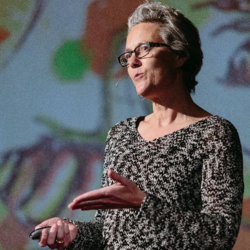Lucy Spelman

Dr. Lucy Spelman is a lifelong animal lover, educator, scientist, and writer. A board-certified zoo and wildlife veterinarian, she treats all species. Her experience includes studying and caring for giant otters, giant pandas, and mountain gorillas.
In 2015, she founded Creature Conserve, a nonprofit organization dedicated to growing a creative community that combines art and science to cultivate new pathways for wildlife conservation. Her work is based on the idea that complex problems, such as biodiversity loss, climate change, and emerging zoonotic diseases, require multidisciplinary solutions. In her words, “At Creature Conserve, our foundational belief is that the arts, informed, inspired, and prompted by science, have the power to direct our attention to the ongoing loss of species and what we can do about it.
In addition to publishing over 40 scientific articles, she is co-editor of two non-fiction books,Creature Needs: Writers Respond to the Science of Animal Conservation and The Rhino with Glue On Shoes, and is the author of National Geographic Kids Animal Encyclopedia. She is currently a senior lecturer at RISD, a clinician at Ocean State Veterinary Specialists, a member of the board of the Wildlife Clinic of Rhode Island, and the executive director of Creature Conserve.
Academic areas of interest
Dr. Lucy enjoys teaching biology—especially zoology and wildlife conservation—to all who are interested in animals, nature, health, and the interconnectedness of life. Her passion for science education and outreach stems from her experiences as a clinical veterinarian, as well as a zoo administrator and field manager. She also has considerable experience in the realm of science communication, having been filmed for various news interviews and television documentaries, and having worked as a media consultant and writer for the Discovery Channel, Animal Planet, and National Geographic.
Dr. Lucy is also a frequent public speaker. Her scientific research interest is in the area of one-health medicine, a growing field of study that examines the interactions between animal, human, and environmental health. Her academic interest is bringing together creatives from all backgrounds—especially artists and scientists—to learn about endangered species and their habitats, share empathy for animals, exchange ideas, and explore the intersection of art, science, and wildlife conservation.
At RISD, she has developed multiple new biology courses, including Biology of Human-Animal Interactions, Evolutionary Biology, Infectious Disease Triangles, and Comparative Anatomy. She also teaches a study abroad course, Southern Africa: Art and Science of Conservation. Her teaching goal is to help students learn the science behind a topic first, and then apply it to their work in the studio. She is especially interested in helping students make scientific information about the ongoing loss of biodiversity more real, understandable, and meaningful.
In addition to the variety of courses she has developed for art and design students at RISD, Dr. Lucy’s most recent book, Creature Needs: Writers Respond to the Science of Animal Conservation, is designed to inspire creative writers of all genres, including poetry and prose, to combine art and science in their work.